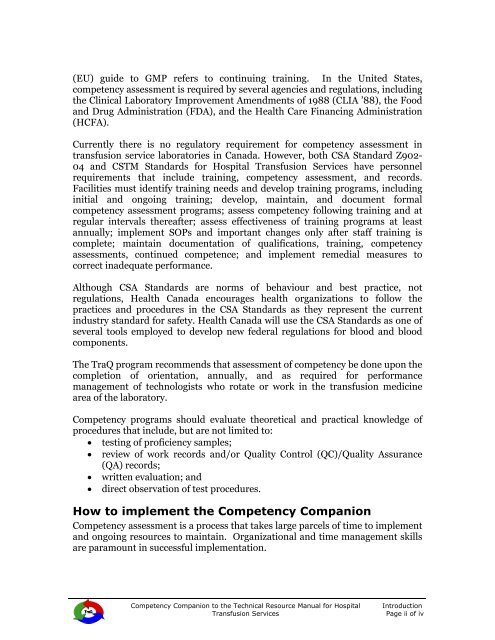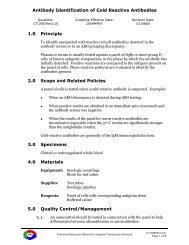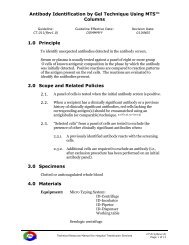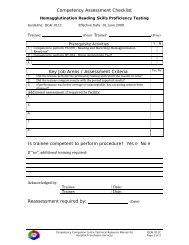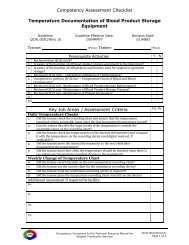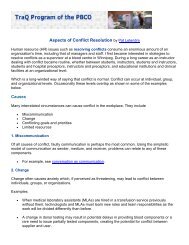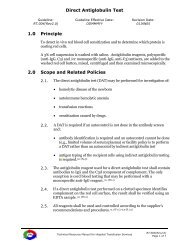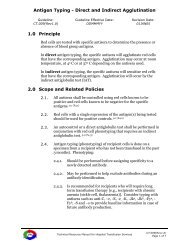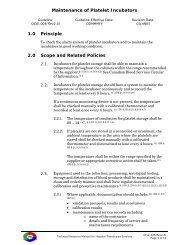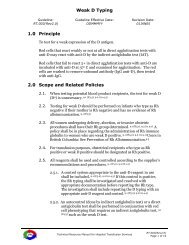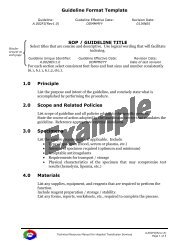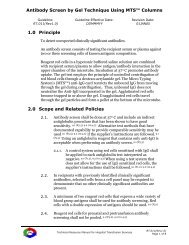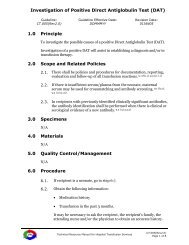Preface What is the Competency Companion? Why assess ...
Preface What is the Competency Companion? Why assess ...
Preface What is the Competency Companion? Why assess ...
Create successful ePaper yourself
Turn your PDF publications into a flip-book with our unique Google optimized e-Paper software.
(EU) guide to GMP refers to continuing training. In <strong>the</strong> United States,<br />
competency <strong>assess</strong>ment <strong>is</strong> required by several agencies and regulations, including<br />
<strong>the</strong> Clinical Laboratory Improvement Amendments of 1988 (CLIA ’88), <strong>the</strong> Food<br />
and Drug Admin<strong>is</strong>tration (FDA), and <strong>the</strong> Health Care Financing Admin<strong>is</strong>tration<br />
(HCFA).<br />
Currently <strong>the</strong>re <strong>is</strong> no regulatory requirement for competency <strong>assess</strong>ment in<br />
transfusion service laboratories in Canada. However, both CSA Standard Z902-<br />
04 and CSTM Standards for Hospital Transfusion Services have personnel<br />
requirements that include training, competency <strong>assess</strong>ment, and records.<br />
Facilities must identify training needs and develop training programs, including<br />
initial and ongoing training; develop, maintain, and document formal<br />
competency <strong>assess</strong>ment programs; <strong>assess</strong> competency following training and at<br />
regular intervals <strong>the</strong>reafter; <strong>assess</strong> effectiveness of training programs at least<br />
annually; implement SOPs and important changes only after staff training <strong>is</strong><br />
complete; maintain documentation of qualifications, training, competency<br />
<strong>assess</strong>ments, continued competence; and implement remedial measures to<br />
correct inadequate performance.<br />
Although CSA Standards are norms of behaviour and best practice, not<br />
regulations, Health Canada encourages health organizations to follow <strong>the</strong><br />
practices and procedures in <strong>the</strong> CSA Standards as <strong>the</strong>y represent <strong>the</strong> current<br />
industry standard for safety. Health Canada will use <strong>the</strong> CSA Standards as one of<br />
several tools employed to develop new federal regulations for blood and blood<br />
components.<br />
The TraQ program recommends that <strong>assess</strong>ment of competency be done upon <strong>the</strong><br />
completion of orientation, annually, and as required for performance<br />
management of technolog<strong>is</strong>ts who rotate or work in <strong>the</strong> transfusion medicine<br />
area of <strong>the</strong> laboratory.<br />
<strong>Competency</strong> programs should evaluate <strong>the</strong>oretical and practical knowledge of<br />
procedures that include, but are not limited to:<br />
• testing of proficiency samples;<br />
• review of work records and/or Quality Control (QC)/Quality Assurance<br />
(QA) records;<br />
• written evaluation; and<br />
• direct observation of test procedures.<br />
How to implement <strong>the</strong> <strong>Competency</strong> <strong>Companion</strong><br />
<strong>Competency</strong> <strong>assess</strong>ment <strong>is</strong> a process that takes large parcels of time to implement<br />
and ongoing resources to maintain. Organizational and time management skills<br />
are paramount in successful implementation.<br />
<strong>Competency</strong> <strong>Companion</strong> to <strong>the</strong> Technical Resource Manual for Hospital<br />
Transfusion Services<br />
Introduction<br />
Page ii of iv


